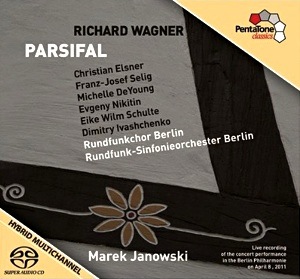The symbolism and themes of suffering and redemption in Parsifal have provided catnip for more than a few oddball stagings filled with Regie excesses. What better then, than a live concert performance ahead of Easter to refocus one’s senses on the music?
The latest installment of Marek Janowski’s Wagner cycle on PentaTone Classics is an April 2011 performance in Berlin that brings plenty of transparency and detail to this “stage-consecrating festival play.” In his previous outings with the Berlin Radio Symphony Orchestra and Chorus, Janowski has taken an almost chamber music-like approach to Wagner scores that emphasizes textural clarities and counterpoint over rich, majestic sonics.
While such careful detail work can reveal new things about a well-loved piece, it doesn’t cover all the bases, especially in a work so laden with mythical elements, in which time often seems to stand still. Janowski knows his way around the score and is capable of injecting fire into a climactic scene. But there’s not enough dramatic shaping of phrases or sensitivity to transitions to capture the layers of mysticism or spiritual radiance here—a problem that left me guiltily eyeing the dusty Hans Knappertsbusch account of this work on the shelf in my den.
That’s kind of a shame, because this Parsifal has some standout vocal performances. Franz-Josef Selig is an especially sensitive Gurnemanz, using his deep, soft voice and scrupulous diction to bring extra depth to the character’s long monologues and emit palpable sense of communal spirit. His only shortcoming is some strain in the upper register when singing at full volume, most evident in moments like the Act 1 transformation scene.
American mezzo Michelle DeYoung downplays Kundry’s screams and unhinged laughter for the concert format, instead emphasizing the character’s sensual qualities with a dark-hued voice that effortlessly soars in the Act 2 scene when she recounts mocking Christ on the cross. She’s matched, maybe even surpassed, in intensity by Evgeny Nikitin, the go-to Amfortas these days, at least judging from his appearance in the same role on Valery Gergiev’s Mariinsky Theatre concert performance. Secure in the idiom if a little strained in his top notes, Nikitin lays out a wonderfully anguished “Ja, Wehe! Weh’ uber mich!” near the end of Act 3, begging the knights of the grail to end his misery with death.
Next to these two, Christian Elsner’s lyric heldentenor is pleasing but a little vanilla in the title role, lacking the passion to make his Act 2 rebuffs of Kundry sound really convincing. Among others in the cast, Eike Wilm Schulte is a suitably chilling Klingsor while Dmitry Ivaschenko‘s huge bass resonates impressively as Titurel.
The Rundfunkchor Berlin is sharp, responsive and wonderfully balanced, consistently nailing the big ensemble scenes and repeating the success it achieved in Janowski’s concert recording of Die Meistersinger. The same goes for the Rundfunk-Sinfonieorchester, whose members seem totally committed to Janowski’s concept and bring wonderful surface effects to the opera’s serene moments, especially in Act 3. Though maybe not a first-tier band, there’s a nice chemistry between musicians and conductor that shouldn’t be taken for granted. The performance is not only neat but fleet, clocking in at 3 hours 46 minutes.
Three installments into this cycle, one takeaway from Janowski’s work appears to be that you don’t need distinctive “take” on Wagner to deliver a successful performance. Indeed, many will find his account a refreshing break from the saturated soundscape of say, a James Levine. The alternate view, I suppose, is one should also expect more depth and musical story-telling in an opera with myriad riches and interpretive possibilities. If you’re looking for a backup recording with most of the pieces in place that’s still a little light on the “wow” factor, this could fill the order.



